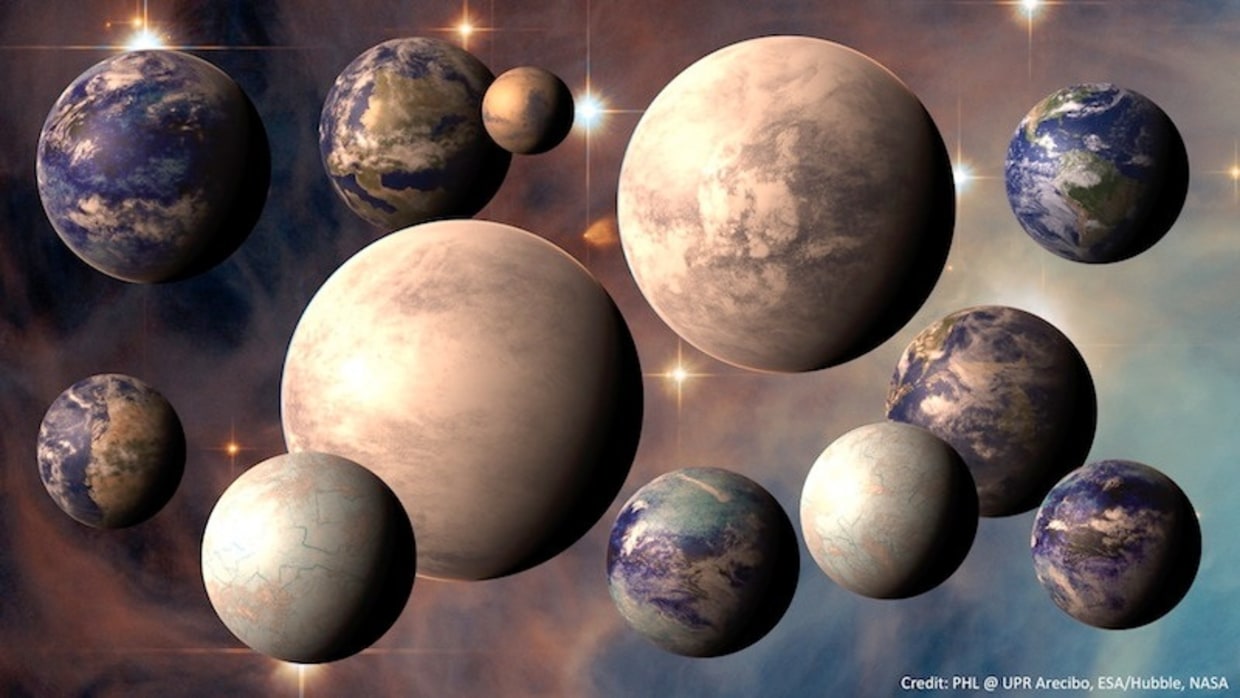Estimates by astronomers
indicate that there could be more than 100 BILLION Earth-like worlds in the
Milky Way that could be home to life.
indicate that there could be more than 100 BILLION Earth-like worlds in the
Milky Way that could be home to life.
Think that’s a big number? According to
astronomers, there are roughly 500
billion galaxies in the known universe, which means there are around
50,000,000,000,000,000,000,000 (5×1022) habitable planets. That’s of course if
there’s just ONE universe.
astronomers, there are roughly 500
billion galaxies in the known universe, which means there are around
50,000,000,000,000,000,000,000 (5×1022) habitable planets. That’s of course if
there’s just ONE universe.
In fact, just inside our own
Milky Way Galaxy experts now believe are some 400 BILLION STARS, but this
number may seem small as some astrophysicists believe that stars in our galaxy
could figure the TRILLION. This means that the Milky Way alone could be home to
more than 100 BILLION planets.
Milky Way Galaxy experts now believe are some 400 BILLION STARS, but this
number may seem small as some astrophysicists believe that stars in our galaxy
could figure the TRILLION. This means that the Milky Way alone could be home to
more than 100 BILLION planets.
However, since astronomers
aren’t able to see our galaxy from the outside, they can’t really know for sure
the number of planets the Milky Way is home to. They can only provide estimates.
aren’t able to see our galaxy from the outside, they can’t really know for sure
the number of planets the Milky Way is home to. They can only provide estimates.
To do this, experts
calculate our galaxy’s mass and calculate how much of that mass is composed of
stars. Based on these calculations scientists believe our galaxy is home to at
least 400 billion stars, but as I mentioned above, this number could drastically
rise.
calculate our galaxy’s mass and calculate how much of that mass is composed of
stars. Based on these calculations scientists believe our galaxy is home to at
least 400 billion stars, but as I mentioned above, this number could drastically
rise.
There are some calculations
which suggest that the Milky Way is home on an average between 800 billion and
3.2 trillion planets, but there are some experts who believe the number could
be as high as eight trillion.
which suggest that the Milky Way is home on an average between 800 billion and
3.2 trillion planets, but there are some experts who believe the number could
be as high as eight trillion.
Furthermore, if we take a
look at what NASA has to say, well find out how the space agency believes there
are at least 1,500 planets located within 50 light years from Earth. These
conclusions are based on observations taken over a period of six years by the
PLANET—Probing Lensing Anomalies NETwork—collaboration, founded in 1995. The
study concluded that there are way more Earth-sized planets than Jupiter-sized
worlds.
look at what NASA has to say, well find out how the space agency believes there
are at least 1,500 planets located within 50 light years from Earth. These
conclusions are based on observations taken over a period of six years by the
PLANET—Probing Lensing Anomalies NETwork—collaboration, founded in 1995. The
study concluded that there are way more Earth-sized planets than Jupiter-sized
worlds.
Read more here.


